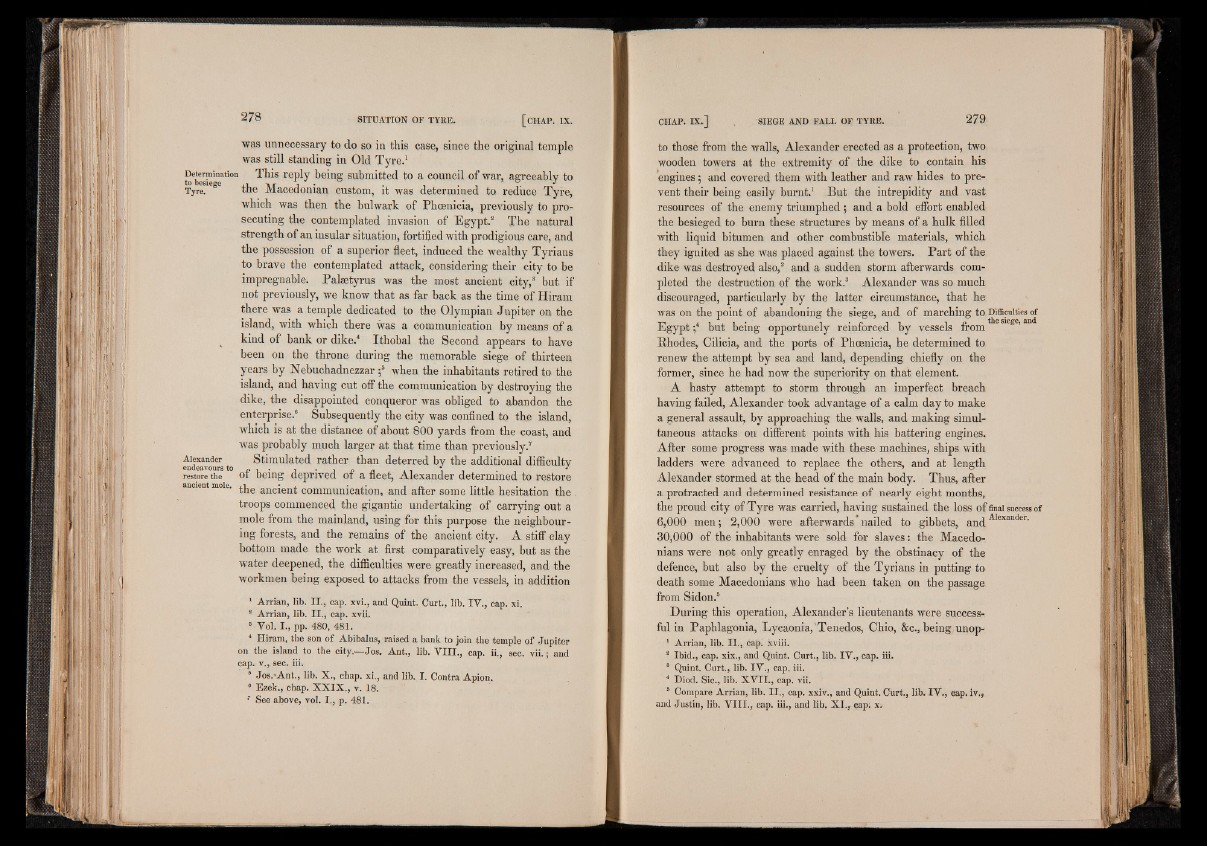
was unnecessary to do so in this case, since the original temple
was still standing in Old Tyre.1
Determination This reply being submitted to a council of war, agreeably to
to besiege ., j • . . J
Tyre. tne Macedonian custom, it was determined to reduce Tyre,
which was then the bulwark of Phoenicia, previously to prosecuting
the contemplated invasion of Egypt.8 The natural
strength of an insular situation, fortified with prodigious care, and
the possession of a superior fleet, induced the wealthy Tyrians
to brave the contemplated attack, considering their city to be
impregnable. Palsetyrus was the most ancient city,3 but if
not previously, we know that as far back as the time of Hiram
there was a temple dedicated to the Olympian Jupiter on the
island, with which there was a communication by means of a
kind of bank or dike.4 Ithobal the Second appears to have
been on the throne during the memorable siege of thirteen
years by Nebuchadnezzar ;5 when the inhabitants retired to the
island, and having cut off the communication by destroying the
dike, the disappointed conqueror was obliged to abandon the
enterprise.6 Subsequently the city was confined to the island,
which is at the distance of about 800 yards from the coast, and
was probably much larger at that time than previously.7
mdeaTOure to Stimulated rather than deterred by the additional difficulty
restore the of being deprived of a fleet, Alexander determined to restore
ancient mole. ^ a n (q e n t communication, and after some little hesitation the.
troops commenced the gigantic undertaking of carrying out a
mole from the mainland, using for this purpose the neighbouring
forests, and the remains of the ancient city. A stiff clay
bottom made the work at first comparatively easy, but as the
water deepened, the difficulties were greatly increased, and the
workmen being exposed to attacks from the vessels, in addition
1 Arrian, lib. I I ., cap. xvi., and Quint. Curt., lib. IV ., cap. xi.
2 Arrian, lib. I I ., cap. xvii.
3 Yol. i | pp. 480, 481.
4 Hiram, the son of Abibalus, raised a bank to join the temple of Jupiter
on the island to the city.—Jos. Ant., lib. V I I I ., cap. ii., sec. v ii.; and
cap. v., sec. iii.
5 Jos.-Ant., lib. X., chap. xi., and lib. I. Contra Apion.
6 Ezek., chap. X X IX ., v. 18.
7 See above, vol. I., p. 481.
to those from the walls, Alexander erected as a protection, two
wooden towers at the extremity of the dike to contain his
engines ; and covered them with leather and raw hides to prevent
their being easily burnt.1 But the intrepidity and vast
resources of the enemy triumphed ; and a bold effort enabled
the besieged to burn these structures by means of a hulk filled
with liquid bitumen and other combustible materials, which
they ignited as she was placed against the towers. Part of the
dike was destroyed also,2 and a sudden storm afterwards completed
the destruction of the work.3 Alexander was so much
discouraged, particularly by the latter circumstance, that he
was on the point of abandoning the siege, and of marching to Difficulties of
Egypt ;4 but being opportunely reinforced by vessels from e siege’311
Bhodes, Cilicia, and the ports of Phoenicia, he determined to
renew the attempt by sea and land, depending chiefly on the
former, since he had now the superiority on that element.
A hasty attempt to storm through an imperfect breach
having failed, Alexander took advantage of a calm day to make
a general assault, by approaching the walls, and making simultaneous
attacks on different points with his battering engines.
After some progress was made with these machines, ships with
ladders were advanced to replace the others, and at length
Alexander stormed at the head of the main body. Thus, after
a protracted and determined resistance of nearly eight months,
the proud city of Tyre was carried, having sustained the loss of final success of
6.000 men; 2,000 were afterwards "nailed to gibbets, andAlexander-
30.000 of the inhabitants were sold for slaves : the Macedonians
were not only greatly enraged by the obstinacy of the
defence, but also by the cruelty of the Tyrians in putting to
death some Macedonians who had been taken on the passage
from Sidon.5
During this operation, Alexander’s lieutenants were successful
in Paphlagonia, Lycaonia,'Tenedos, Ohio, &c., being, unop-
1 Arrian, lib. I I ., cap. xviii.
2 Ibid., cap. xix., and Quint. Cart., lib. IV ., cap. iii.
8 Quint. Curt., lib. IV ., cap. iii.
4 Diod. Sic., lib. X V II., cap. vii.
5 Compare Arrian, lib. I I ., cap. xxiv., and Quint. Curt., lib. IV ,, cap. iv.,
and Justin, lib. V I I I ., cap. iii., and lib. X I ., cap: x.